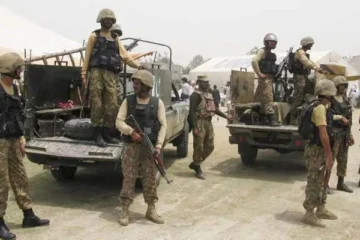Indo-Pak reproachment: A bumpy road lies ahead

After the re-enactment of the 2003 cease-fire agreement between India and Pakistan, hopes for lasting peace between these two nuclear-armed neighbors are on the rise again but the path will not be an easy one. A series of positive developments including PM Modi’s letter of goodwill to PM Khan on the occasion of 23rd March and now both sides have agreed to continue talks over the Indus water treaty, followed. SAARC summit is likely to happen in Pakistan and hopes for an Indo-Pak cricket series are also on high.
There is a lot of buzz on a high-level meeting between Indian and Pakistani leadership in UAE as Indian Army chief Gen. MM Naravane visited UAE and Saudi Arabia recently. It seems the heavy burden of helping ease the uneasy relations among the South Asian neighbors has been taken by Gulf states. But considerable steps have been taken to attach the threads of peace in the past but these initiatives couldn’t last long largely due to geo-strategic and domestic compulsions of both countries.
PM Imran while taking office showed an intent to have productive relations with India. It is in the interest of both countries to enhance trade and cooperation and this viewed is shared by the global and regional players. But Indian side greeted the offer with the abrogation of articles 370 and 35A of its article thus ending the special status of disputed Kashmir.
The Kashmir Conundrum
Normalization of tense ties between any two nations requires confidence-building measures (CBM’s) before engaging in some productive and result-oriented dialogue. In the case of normalization of Indo-Pak ties which has been no easy task in the past and demands bold steps to be taken and, on the top, lies the will to have a dialogue on the issue of Kashmir. The revocation of articles 370 and 35A by India on August 5 and plummeting human rights in Kashmir have spawned a hue and cry in Pakistan.
During his election campaign, BJP declared decades-old articles 370 and 35A as a hindrance in the progress of Kashmir and vowed to revoke the special status of the Muslim majority state. As PM Modi fulfilled his aspiration, he and his aides, depicting the step as a massive success, bragged a lot about the issue to consolidate the right-wing vote bank. It would be extremely difficult for an Indian government, whose major part of the political gamble revolves around the aggressive and assertive foreign policy posture especially on the disputes with neighbors, to show any flexibility on the issues like Kashmir.
In Pakistan, the issue of Kashmir has remained central to politics since the very inception of it and part of it was freed from Indian control by local tribal fighters which portrays the sentiments attached to the issue of Kashmir. After the revocation of the special status of Kashmir, Pakistan’s establishment found itself in an awkward position where it was unable to respond effectively. Pakistan’s govt unable to do anything concrete launched a vociferous media and diplomatic campaign to malign India and even compared PM Modi with Hitler thus ended up further infuriating the public.
Not surprisingly, the sudden wish for peace and notion of “forgetting the past and moving forward” met with a fierce response from opposition parties as well as from the strategic community. PM Khan and his party in the past had viciously criticized the ex-PM Nawaz Sharif’s attempts to normalize ties with India. With the worsening economic condition, the incumbent government has no other card to play, being vocal about Kashmir could have been one but the prevailing condition is ruling out the possibility of that one too and the PM Khan and seasoned politicians around realize this fact quite vividly. Staying on the path of reconciliation would require courage and determination. The recently announced decision to resume trade with India is halted after huge criticism by the opposition.
The deepening imparity
“For nearly four decades, the tragic conflict in Afghanistan has provided the Pakistan Army immense leverage with other powers. Rawalpindi was unable, however, to translate that leverage into concrete gains” according to Raja Mohan. And now with increasing Chinese assertiveness in the region the United States is shifting its energy and resources from Afghanistan and the Middle Eastern region to the pacific theater to serve that purpose it has changed the lens to look at India and started contemplating it as a potential balancer in the region against rising Chinese power, a view largely shared by analysts at Islamabad Security Dialogue.
To implement this new policy, the US has initiated immense cooperation with India in the defense sector as the United States designated India as a Major Defense Partner. “Commensurate with this designation, in 2018, India was elevated to Strategic Trade Authorization Tier 1 status, which allows India to receive license-free access to a wide range of military and dual-use technologies regulated by the Department of Commerce.”
To correspond with this tier 1 status now significant agreements like Logistics Exchange Memorandum of Agreement (LEMOA), Communications, Compatibility and Security Agreement (COMCASA), and the Industrial Security Agreement (ISA) are now in place, as per State Department. Analysts are anticipating the QUAD summit as a part of the wide arrangement of the United States to build a counterforce in the pacific. All these aims to improve India’s military capabilities against China’s PLA but it also adds to Pakistan’s vulnerability against India. All these new developments will hurt the delicate strategic balance in South Asia.
Conclusion:
Pakistan which has always considered India its prime adversary and tried to maintain parity with India and being 10 times smaller economy than India relied heavily on economic and military aid from the US. Pakistan has been receiving military support from China but its leadership realizes the fact that it is not the substitute for the political and economic support of the United States. But due to worsening economic conditions and new strategic compulsions, it has opted the course of reconciliation with a hegemonic and obstinate India as Ambassador Ashraf Qazi alluded to “lack of options”.
The sudden idea of making peace with its neighbor which Pakistan has long perceived as its chief antagonist is, as it has been the case in the past, a push from a third party. As long as both these neighbors don’t show the will to come to the negotiation table on some of their core issues, it is unlikely to have a result-oriented dialogue on the urge of the party.
Stay tuned to Baaghi TV for more. Download our app for the latest news, updates & interesting content!












